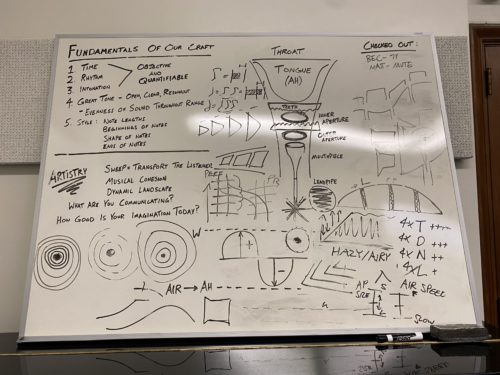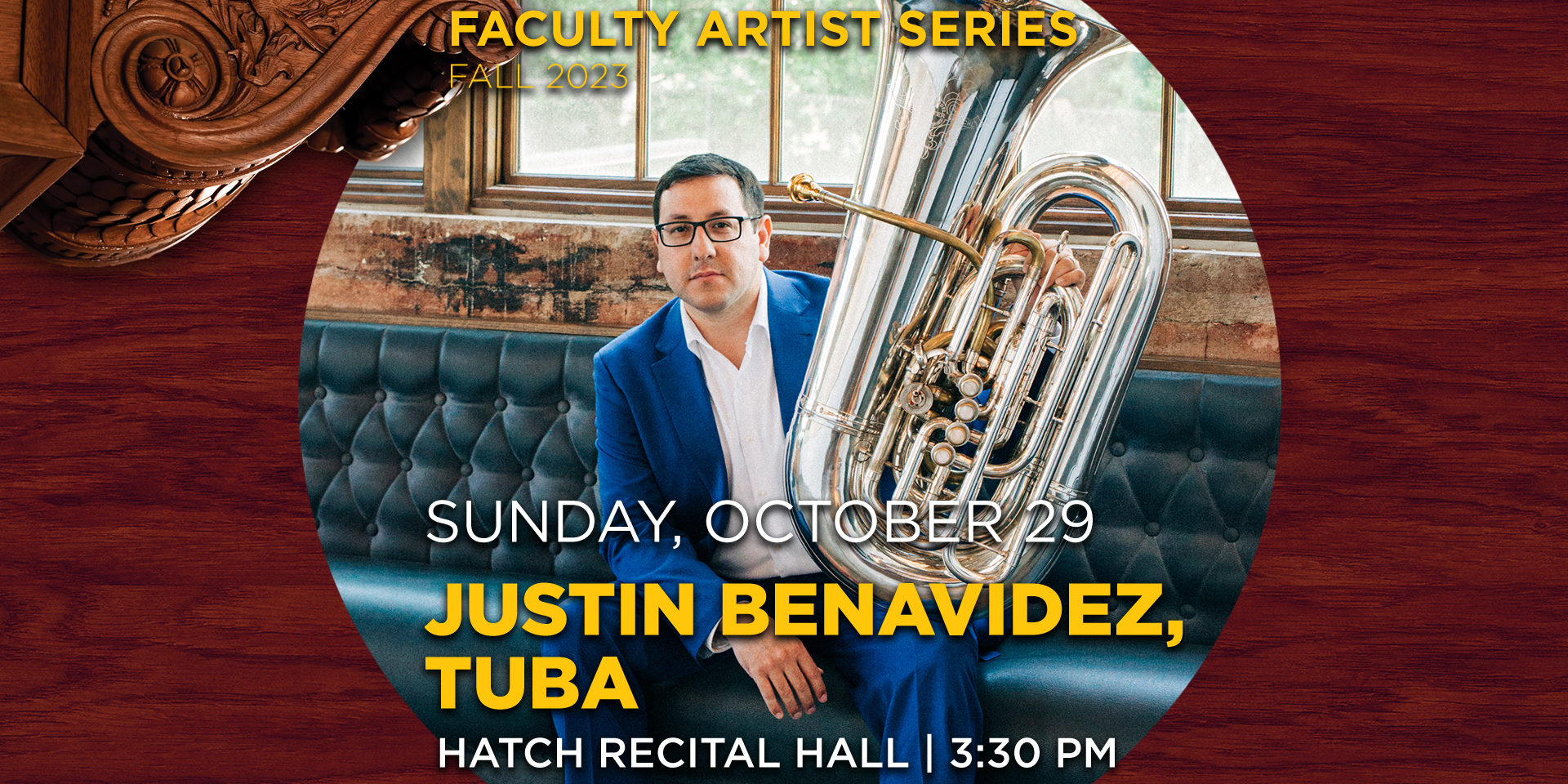
Benavidez keeps a whiteboard outlining fundamentals in his studio, with artistry (his Golden Rule) as a main component he stresses to students.
In a recent studio lesson, Eastman School of Music’s new Associate Professor of Tuba and Euphonium Justin Benavidez coached a student on the Eric Ewazen Concerto for Tuba.
“Can you make it ring on every note?” Benavidez asked his student. Benavidez proceeded to demonstrate the ascending line with tones that rang out like warm bells. With virtuosic ease. On a tuba.
And then he brought up the Golden Rule: to play in a compelling way that always communicates a message to listeners.
“In our discipline, a lot of thought goes into being accurate and playing with a good sound and playing with great intonation,” explained Benavidez after the lesson. “And as I tell my students, we need that, of course, but that’s literally the skill that allows the listener to walk into the room of your idea. And if they walk into the room and there isn’t really a message worth hearing, then we haven’t done the music a service.”
It’s also the golden skill that propelled Benavidez from a kid who couldn’t even afford a tuba or private lessons to one of the nation’s top players and teachers. Benavidez’s compelling playing will be on display in his first Faculty Artist Series recital on Sunday, October 29 at 3:30 p.m. in Hatch Recital Hall.
A San Antonio, Texas native, Benavidez joined his school band because his parents didn’t want him to get hurt playing sports without health insurance. The band needed a tuba player and Benavidez needed community. But there were economic barriers to pursuing it seriously: he couldn’t afford to take private lessons or own his own instrument. He never even made it into an all-state band. But he was determined to keep playing.
“Music was the thing I couldn’t figure out,” he says, despite being a strong student in other subjects. “I thought, ‘I’m going to go to college, and I want to figure this out.’”
In college, Benavidez did more than just figure out tuba playing: He discovered a passion for teaching students of all ages. While pursuing his advanced performance degrees at the University of Michigan, he looked up to his teacher, who balanced a full teaching studio while also serving as first-call substitute for the Los Angeles Philharmonic and Chicago Symphony, and thought, “I want your job.”
He was on track as a teacher, giving private lessons during his schooling, but also developed significantly as a performer: He placed third in his first-ever competition, the Falcone International Tuba Euphonium Student Competition in 2004, as an undergraduate student at North Texas University, and then went on to become a prizewinner in several international solo competitions. The performance accolades mounted, eventually leading to fellowships and concerto performances at the Aspen Music Festival and beyond.
Following his doctorate degree, he landed his first teaching job at a small Texas university that served an underprivileged Hispanic community. “It was certainly trial by fire, learning how to motivate students who sometimes don’t come with all the motivation that you might expect, who don’t have the conservatory style background that I had.”
After four years, he was hired at Ithaca College, and then at Florida State University, where he ran a huge studio of over 30 students. All the while, he was invited to perform with many professional orchestras and gave solo recitals and masterclasses internationally as his reputation grew.
“And this magnificent opportunity opened up,” he says of the open tuba professor position at Eastman, “and I thought, ‘I have to throw my name in for this.’ I had always seen Eastman as one of the preeminent institutions in the world.”
Benavidez brings his background and teaching experiences to Eastman, focused on discovering top talent in underprivileged communities. He is prioritizing making recruiting connections in music programs in inner city Chicago, Atlanta, and even in Dallas, alongside the usual recruitment efforts at top high school music programs like Interlochen. “I’m thinking about things I can do to embrace all,” he says.
He wants students with curiosity and discipline, and not just pure talent. And, of course, students who he believes can achieve his Golden Rule and communicate the music beyond its technical challenges.
At Eastman, Benavidez is doing the job he sought out all those years back in college: balancing intense teaching with performing. A major recording project he engaged in while teaching at Florida State University called Storyteller (released on Bridge Records in 2022) included a new tuba concerto by the rising Vietnamese-American composer Viet Cuong, originally composed for tuba and wind band. It caught the attention of Albany Symphony Music Director David Alan Miller, who invited Benavidez to perform a premiere of the work with orchestra accompaniment with the Albany Symphony on subscription series concerts in April 2024. Benavidez and the Albany Symphony will also commercially record the work.
“It is rare for any tuba player to be able to perform a major piece in front of an orchestra much less an orchestra like Albany,” says Benavidez.
Although the tuba is usually the background, as harmonic support in ensembles (an important role, Benavidez says), Benavidez’s playing displays the tuba as an instrument of incredible range, both emotionally and virtuosically. He’ll demonstrate the tuba’s full capabilities—and his Golden Rule—at his FAS recital on Sunday.
The first work on the recital is by composer Todd Goodman, a concerto that Benavidez premiered with the United States Army Band “Pershing’s Own.” The first movement may be familiar to some in Eastman’s tuba studio: Benevidez performed it on his audition recital for his Eastman faculty position. The second work is a Romantic-esque work called New Kid by composer Anna Baadsvik, a Norwegian composer married to one of the world’s most famous tuba players, Øystein Baadsvik. Although Øystein Baadsvik premiered the work, Benavidez was the first to record it on his album Storyteller.
The next two provide a contrast and display Benavidez’s penchant for transcriptions. He’ll make the tuba sing in a transcription of Mahler’s Songs of a Wayfarer, and will dance all the way to the recital’s end with an arrangement of Piazzolla’s Tango Suite for Two Guitars, which combines nuevo tango, jazz, and classical genres. He says, “It’s probably one of the hardest things I’ve ever tried to play, but it’s also very fun to listen to.”
Faculty Artist Series: Justin Benavidez, tuba
Hatch Recital Hall | 3:30 p.m.
Tickets for Eastman’s Faculty Artist Series are $10 for the general public and free to URID holders. General Admission tickets will be available for purchase at each concert. Visit www.esm.rochester.edu/theatre/ for more information.
